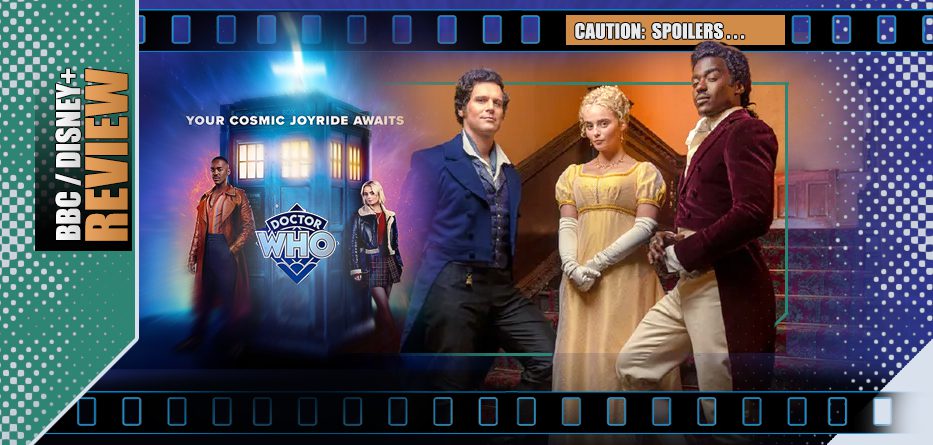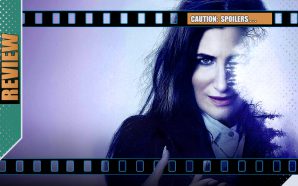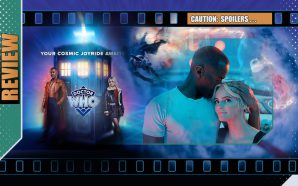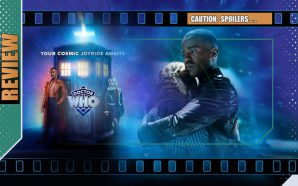The Doctor and Ruby are gatecrashing an estate party in 1813, where Ruby is enjoying the distinct ‘Bridgerton’ vibe. Unfortunately, but rather typically, the duo’s latest jaunt isn’t going to merely involve dances and duchesses. It seems guests at a duchess’s party are being murdered by something distinctly alien and on a balcony overlooking the dance-floor, a mysterious bounty hunter called Rogue is about to impact the Doctor’s life…
*spoilers*
Penned by Loki‘s Kate Herron and Briony Redman rather than Russell T Davies himself, it’s to the show’s credit that in more general terms one can imagine a multitude of Doctors handling the basic outline, each with different presentations. In many ways, Rogue is a return to the early days of the modern Doctor Who – Russell T Davies’ first show-running era of the show and perhaps the hardest days of relaunching and re-establishing a Time Lord fit for the latest generation of the time. The last couple of episodes have been quite experimental, but the format of this latest entry fits a more familiar classic structure: the Doctor and their companion landing somewhere in history and getting caught up is some secret extra-terrestrial threat. A case of the ‘don’t think too deeply but enjoy a good romp‘ variety which is sometimes no bad thing as long as it doesn’t rely on ignorance itself.
Rogue repeatedly screen-namechecks the popular Bridgerton as an influence, enjoying the pomp, circumstance, pride, prejudice, sense and sensibility of the Regency Era and all with its tongue in avian cheek. We have a familial enemy contemplating invasion (think Family of Blood or the Slitheen) and having their perception of Earth’s customs shaped by flimsy historical televisual stereotypes. Here, there’s the murderous alien factor and the fish-out-of-water aspects. The Doctor is off being held hostage for the first half and to that extent, it’s Ruby who is somewhat sidelined with a spurious, if enjoyable – B-plot in which she talks with the 1813 in-crowd and probably introduces several modern words that wouldn’t be commonplace for a couple of centuries hence. Like Ace, Sarah-Jane, Rose or Clara, she’s smart, sassy and if inevitably a damsel-in-distress for the climax, there’s never any real sense that the Doctor’s going to decide against saving her.
Jonathan Groff (Mindhunter) is a great guest-star, willing to play the foil and let Gatwa’s Doctor set things up then batting it back with form. On a purely personal note, the Doctor’s immediate flirtation with Rogue feels better when it’s bubbling under rather than bubbling-over. The Doctor always both resents and delights when his actions are challenged or even matched, a battle of wits on multiple levels. In the scenes where Groff and Gatwa banter back-and-forth, each revealing a little more than they probably should, there’s a sense of great chemistry and mischievous momentum, enjoying the pure dance of it all. It’s certainly not true that the Doctor has always been asexual (Tennant’s version married a queen, Smith’s was apparently involved with Marilyn Monroe and Capaldi gave River Song the best last night of her life) and even in the classic era, the Doctor had been known to charm with the flicker of a smile and give a wink if the situation called for it. But, generally, the Doctor has been ‘above it all’ through much of the show’s general remit and the character has largely avoided meaningful connections on a deeper level other than vague, temporary, deep but mayfly ‘companionship’. The Doctor actively flirting rather than just being flamboyant as a tactic seems more alien to the show.
Gatwa has been a regeneration of that – still a Time Lord with two hearts and little use for guns, battling for the underdog and going where the cosmic winds blow him, but now turning every emotion up to ‘eleven’ in the mayhem of life experiences. So, it’s not that romance couldn’t be on the menu, but I’m of the position that the nature of the show doesn’t need it to work wat its best and that position is something of a welcome rarity in the modern schedules. So, creatively, things move a little faster than they really should here – from flirtations to revelations to outright ‘find me‘ romantic regret. If it’s a one-off appearance, then there’s an argument this is a compact-and-bijou excursion that’s just filling the very specific Jack Harkness / John Barrowman wound – albeit with a more brooding version – that the show has had for a while and reaffirming its modern queer credentials. However, if Groff / Rogue is to come back again (and they really should and probably will) there would be better potential in the slower-burn and tragic transient nature of eventually moving on rather than the kiss-me-quick drive-by. Either way, it might have had more impact if the episode hadn’t gone in for the actual kiss so quickly. It might be Pride Month and the show is a willing standard-bearer of ‘viva la difference!‘ but the joy of subtext is sometimes better to stick to in initial encounters… and it would be a shame if The Doctor became James T. Kirk.
The show’s other main guest-star, Indira Varma (of Game of Thrones, Luther and, yes, early Torchwood fame) has the time of her life, absolutely nailing the mission statement of it all.
The alien make-up/VFX isn’t anything special and with the exception of the transformations, it feels like the kind of OTT prosthetics that the 2005 show could have managed. But it’s all location, location, location and the ‘estate’ makes a great backdrop.
Of course, die-hard fans will be talking about one other brief ‘moment’ that will largely have passed by casual viewers. In the montage of previous Doctor faces that are displayed on Rogue’s screen, not only are the incarnations in a somewhat random order but ther’s also an image of Richard E. Grant in there. (When the series was on its hiatus between the late 80s and mid-Noughties, Richard E Grant played a more austere ‘Ninth’ Doctor in the flash-animated Scream of the Shalka, broadcast in 2003 and written by veteran Doctor Who scribe Paul Cornell. Russell T Davies’ ultimate reinvention of the live-action show decided to relegate that version to a non-canon status with Davies apparently disliking Grant’s performance. While this is likely to be a deep-dive, one wonders on the reasoning of such a specific easter egg.
Ultimately, Rogue is mostly silly stuff with elements that won’t appeal to everyone or some Who purists but everyone is clearly having fun and adding more ticks in the wide checklist of what the show can and will do. No, it’s not your Grandfather’s Who (or , indeed,Who‘s Grandfather), but Gatwa, Gibson and Groff embrace the tone and if you can enjoy it as just a subversive Regency romp culture clash then it delivers fine enough…
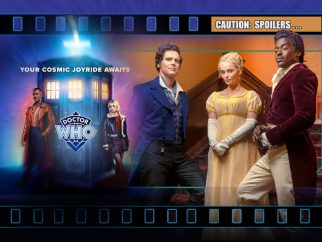
- Story7
- Acting8
- Direction8
- Production Design / VFX8

